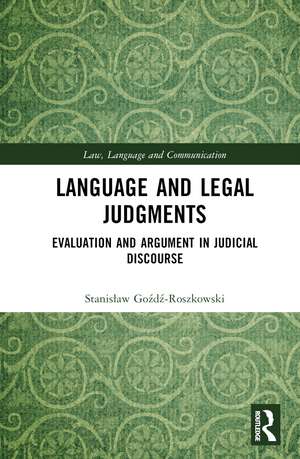Language and Legal Judgments: Evaluation and Argument in Judicial Discourse: Law, Language and Communication
Autor Stanisław Goźdź-Roszkowskien Limba Engleză Hardback – 6 feb 2024
Din seria Law, Language and Communication
-
 Preț: 382.39 lei
Preț: 382.39 lei -
 Preț: 311.06 lei
Preț: 311.06 lei - 17%
 Preț: 260.07 lei
Preț: 260.07 lei - 20%
 Preț: 251.70 lei
Preț: 251.70 lei -
 Preț: 481.07 lei
Preț: 481.07 lei - 17%
 Preț: 259.98 lei
Preț: 259.98 lei - 17%
 Preț: 259.98 lei
Preț: 259.98 lei - 17%
 Preț: 259.98 lei
Preț: 259.98 lei - 13%
 Preț: 338.33 lei
Preț: 338.33 lei - 25%
 Preț: 851.40 lei
Preț: 851.40 lei -
 Preț: 349.08 lei
Preț: 349.08 lei - 17%
 Preț: 256.02 lei
Preț: 256.02 lei -
 Preț: 485.04 lei
Preț: 485.04 lei - 17%
 Preț: 259.98 lei
Preț: 259.98 lei - 17%
 Preț: 259.98 lei
Preț: 259.98 lei - 16%
 Preț: 274.25 lei
Preț: 274.25 lei - 13%
 Preț: 338.33 lei
Preț: 338.33 lei -
 Preț: 382.50 lei
Preț: 382.50 lei -
 Preț: 382.87 lei
Preț: 382.87 lei - 17%
 Preț: 237.44 lei
Preț: 237.44 lei -
 Preț: 380.89 lei
Preț: 380.89 lei - 17%
 Preț: 258.89 lei
Preț: 258.89 lei - 16%
 Preț: 130.21 lei
Preț: 130.21 lei - 18%
 Preț: 984.64 lei
Preț: 984.64 lei -
 Preț: 383.09 lei
Preț: 383.09 lei - 18%
 Preț: 985.67 lei
Preț: 985.67 lei
Preț: 985.09 lei
Preț vechi: 1201.33 lei
-18% Nou
Puncte Express: 1478
Preț estimativ în valută:
188.62€ • 194.57$ • 156.33£
188.62€ • 194.57$ • 156.33£
Carte tipărită la comandă
Livrare economică 20 februarie-06 martie
Preluare comenzi: 021 569.72.76
Specificații
ISBN-13: 9781032366906
ISBN-10: 1032366907
Pagini: 186
Ilustrații: 11 Tables, black and white; 8 Line drawings, black and white; 1 Halftones, black and white; 9 Illustrations, black and white
Dimensiuni: 156 x 234 x 13 mm
Greutate: 0.5 kg
Ediția:1
Editura: Taylor & Francis
Colecția Routledge
Seria Law, Language and Communication
Locul publicării:Oxford, United Kingdom
ISBN-10: 1032366907
Pagini: 186
Ilustrații: 11 Tables, black and white; 8 Line drawings, black and white; 1 Halftones, black and white; 9 Illustrations, black and white
Dimensiuni: 156 x 234 x 13 mm
Greutate: 0.5 kg
Ediția:1
Editura: Taylor & Francis
Colecția Routledge
Seria Law, Language and Communication
Locul publicării:Oxford, United Kingdom
Public țintă
PostgraduateNotă biografică
Stanisław Goźdź-Roszkowski is Associate Professor and Head of Department of Specialized Languages and Intercultural Communication at the University of Łódź, Poland.
Cuprins
About the Author; Preface; Part I: Introduction; 1. Evaluation. What is it, and why does it matter? 2. Evaluation, argumentation and the justification of judicial decisions; Part II: Evaluative language patterns as a persuasive device; 3. Evaluating processes and propositions; 4. Evaluating status and sites of contention; Part III: Uncovering evoked and less obvious evaluative meanings; 5. Value-based lexis and argument in morally sensitive issues; 6. Evaluative language, the Ideal Model of Critical Discussion and Strategic Manoeuvring; 7. Pulling the strands together.
Descriere
Integrating research methods from Linguistics with contemporary Legal Argumentation Theory, this book highlights the complexities of legal justification by focusing on the role of value-laden language in argument construction and use.
